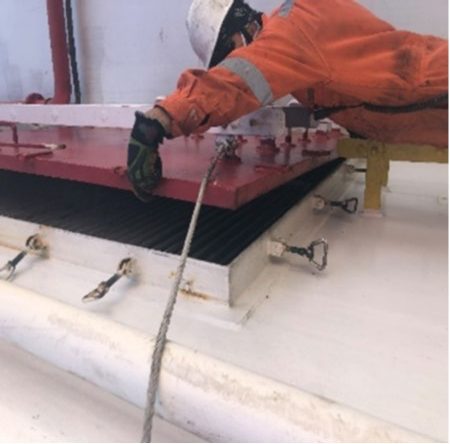A recent IMCA Safety Flash focuses on an incident in which a crew member injured his finger while opening an emergency fire flap, to provide lessons learned.
The incident occurred after an annual test of the deluge system during which the emergency fire flaps had to be closed. Two crew members were releasing the securing butterfly nuts on the fire flap for the emergency generator. The final nut would not release owing to air pressure on the flap. A rope was attached to the hatch and pulled to reduce the pressure, to allow the butterfly nut to be released and to prevent potential uncontrolled swing of the hatch due to pressure build up.
As the last butterfly nut was released, one of the workers got his index finger accidentally jammed between the hatch door and the frame as his colleague was still pulling the hatch in the opposite direction. His finger was crushed, he was sent ashore to hospital, where X-rays revealed a broken finger.

What went wrong
- Risk seen as tolerable – the work party considered the work to be safe. There was inadequate understanding of the risks involved: opening and closing of fire flaps was not captured during Toolbox Talks, nor in the Risk Assessment for the annual inspection on the deluge system.
- There was a lack of proper planning, and there were inadequate resources – the weight of hatch door was not taken into consideration when assigning the job. Also an inappropriate tool was used (a rope) to ease the pressure on the nut.
- No Stop Work authority was exercised – The job should have been stopped and reassessed when the team came across difficulty in releasing the nut.
Lessons learned
- Ensure suitable and sufficient risk assessment is conducted for all tasks, whether routine or non routine, and that all aspects of the task are covered.
- Ensure all personnel involved in any operation are properly briefed in detail during toolbox talks regarding hazards associated with the task, and controls in place to ensure safe and smooth operation.
- Risk Assessments and toolbox talks are not one-way conversations, but an opportunity for ALL team members to speak up and ask questions, discuss the task, ensure all control measures are in place and that everyone is clear on their duties and responsibilities during the job.
- If you need to change things, don’t just carry on: exercise the Stop Work Authority. Stop, step back, and reassess the task to find a safer, easier alternative.
- Understand “Line of Fire” – see IMCA short video here and longer video here.






























































